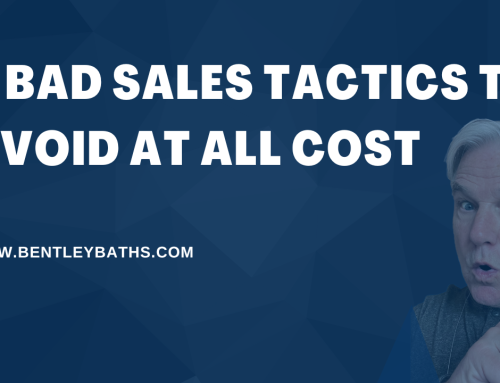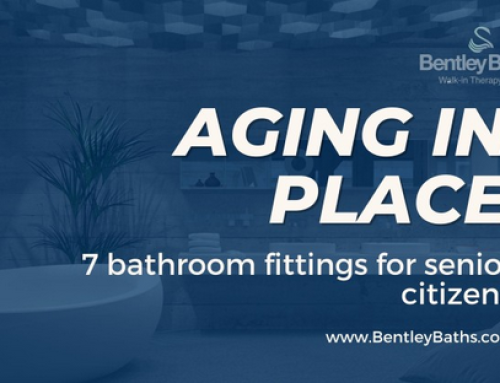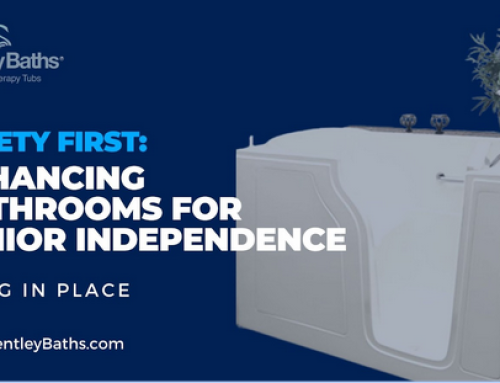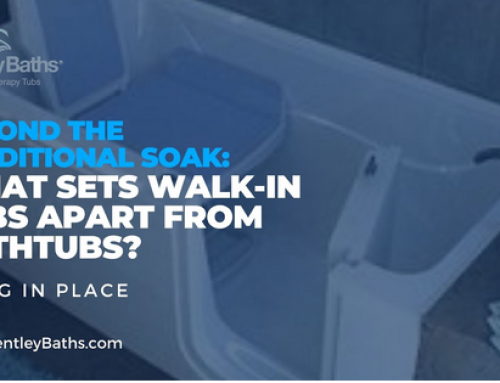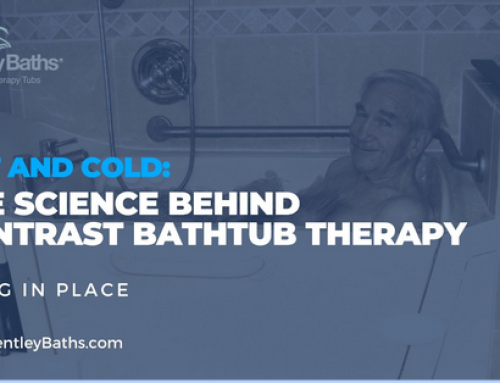The Walk-in Tub Salesperson Entering Your Home is a PRO!
How many walk-in tubs have you bought? None? Maybe you’ll only buy one in your lifetime. But let me tell you something, the walk-in tub salespeople that are coming into your home to try to sell you a walk-in bathtub is a professional. They sell walk-in bathtubs all day long, 5-6 days a week, 3-4 times a day! They’re very practiced and they know exactly what they’re doing. They have one objective. That objective is to sell you a walk-in tub at the highest price possible. They are there to make money for themselves and the company, they’re not there to necessarily do what’s best for you.
So you need to be prepared to protect yourself. And today, I’m going to share with you a few of the actual closing tactics that many walk-in bathtub salespeople use to get you to buy that night. They’re going to put you through five NOS, and I want you to be prepared for that.
Walk-in Tub Sales People Are Judged by Their Closing Ratio.
Walk-in bathtub leads are VERY expensive for the high volume, name-brand walk-in tub companies. Their salespeople are like mercenaries… they have hired guns whose job is to close the sale – PERIOD.
They are also pressured by their companies to make sales and are almost always in a competitive environment, where the company monitors how many closes (sales) each walk-in tub salesperson is making… as compared to the other salespeople. Their “closing ratio” is a key measure of how well they are doing. Generally, they MUST sell 50% of their leads, and the walk-in tub company wants them to close 70%+.
This environment creates an artificial need to pressure the consumer in ways that are often not in your best interest. The walk-in tub sales operations rely on closing ratios. Who’s closing the most walk-in tub deals and who’s closing them at the highest price?
The Stick Factor.
The walk-in bathtub salesperson is also judged by what is called a “stick factor” or “cancellation rate”… meaning the walk-in tub sales company will measure how many cancellations a salesperson gets. While that’s an indication that the salesperson is manipulating and highly pressuring people, or pushing people to buy who are not qualified or committed. What happens is that when the consumer has time to think about it, they cancel the contract. Walk-in tub companies HATE this. Most will then take that lead away from the walk-tub salesman and try to re-close the sale directly, with more discounts and pressure.
But, large name-brand walk-in tub companies (among many other direct sales operations) have been using these techniques for decades.
Here Are Just A Few Common “Closing” Tactics.
Once the walk-in tub salesperson has gotten you down to the point that they’ve reduced their pricing to the pre-planned “30-day” price, now they’re going to try to close you by getting you excited about these price reduction gimmicks. Their goal is to drill you down and give you a price you just cannot resist to close you tonight. But, they must come up with some seemingly logical explanation for why they can keep reducing your price.
1. The “Show Home” Close.
We all remember and loved the “Extreme Home Makeover” TV shows, right? The idea is that companies will give great discounts or do things for free for being able to promote a beautiful new show home. A walk-in tub salesman using this manipulative ploy may say something like this:
“Ms. Jones, I’ve got you all the way down to $19,000, I can see you need this and you want it, and I’m trying to do everything I can to help you. We’ve started a great new program, and as an area manager, I can create what’s called a “show home”. Now I can’t give anything away, but if you would agree to let us take before and after pictures of the installation process if you’ll let us put a yard sign out in the yard during the project, and if you’ll agree to show your new tub to 5 people you know… I can give you another thousand dollars discount! We will be able to use a beautiful new walk-in tub installation for our marketing and advertising purposes. And you KNOW we are going to make your bathroom special! At $18,000, are we ready to go?”
As you already know if you watched the pricing video, this is not true. The PAR price has always been $18,000, and they are just trying to get you to buy at that price.
2. The Financing Close.
Another one that you need to be careful of is the financing close. Many of the big-name walk-in bathtub companies start with funding and monthly payments to get you to think the project is not that expensive. During the entire sales process, they will refer to “you can have everything for as little as $125/month.” Or, “we can do everything for you and offer you 0% financing.”
They’ll put teasers like “0% for 48 months, with no payment for 12 months” in their ads. They are doing this to get more people to respond to the ad. But, when it gets down to the point that they’re trying to close you, they’re gonna sell you on the payments. Many walk-in tub salespeople are going try to sell you on the idea of “free money”? BEWARE!
I’m just telling you as a lawyer, these loans are very important, and they’re often quite complicated. But once signed, they are binding! You need to be very careful before you enter into any financing agreement when you don’t fully understand all the terms and conditions.
Just keep in mind, “banks do not just give money away”. NEVER. When somebody starts offering you 0% financing and no payments for X number of months or whatever it is, they’re going to try to close you by saying “it’s 0% interest, I’ll even make the first payment, how can you say no to that?”
Well, the reality is the money that the bank charges is packed into the price you’re paying. And you need to be very careful because many of these 0% programs at the end have a landmine. That is you either pay the loan off at the end of that 0% period, or the loan principal re-clocks back to the beginning, and they add the interest back in at a default rate! Also, on any financing, the walk-in tub dealer will almost always be paying a “dealer fee” (a percentage of the contract amount) as a discount to the bank.
This means, for example, if your walk-in tub purchase contract is for $20,000 and the bank has a 5% dealer fee, you are paying back the full $20,000, but the walk-in tub company is only being paid $19,000. The bank takes that 5%. Generally, the lower the interest rates and better the terms, the higher the dealer fee the bank charges.
So, you want to be very very careful. And, I’m not saying every loan product is like that, but quite a few of them are, you need to be very careful about that.
But just remember that money is packed into the price the walk-in tub company is charging you. If they start promoting financing to close you, your next question should be “Okay, if I take financing you’re going pay a fee for that, right? So what’s my cash price?”
I’ll just tell you, cash price means less cost to the walk-in tub company. The banks charge 3%-5% to allow you just to use a credit card. If you’ve been priced based on them accepting a credit card and you suggest “I want to pay cash”, what legitimate company wouldn’t say well sure, I can give you a 3% discount – because it’s legitimate. Or, if they gave you the cash price, and you say “I want to use a credit card” the walk-in tub company could want to add that 3%-5% onto the price because it is a real cost. It relates to money that’s changing hands one way or the other.
So just remember, banks don’t give money away.
3. The “Out of Box” or “Misorder” Close
Again, a dishonest closing tactic that has been around for decades is the “out of box” close. Again, the walk-in tub salesperson is being creative to come up with a seemingly logical reason that they can sell you this highly expensive product for such a low price. They may use “scratch and dent” or the suggestion that a tub was incorrectly ordered for a customer and now must be liquidated.
“You know what, I just remember we have a unit that was delivered by the factory, but it was the wrong hinge! We had to re-order the correct walk-in tub, but now I have this one that I need to get rid of. I tell you what, rather than return this one to the factory, I can give you an additional $1,000s off. How does that sound? Any reason I shouldn’t write you up now? You’ll never do better than this.”
4. The “BIG ORDER” Close.
Another technique that some of these salesmen will use is what I call the big order close. They’ll think of an excuse to close you as a basis for adding more discounts to give you a better price. So again, in this example, I’m going to say they have got you down to $19,000 and you’re sticking up and not saying yes. They are trying to close you tonight for $19,000, but let’s say their PAR is $18,000.
They may do something like the big order close. They may say:
“Ms. Jones, I can see you guys want this, I’m so excited for you guys to have it, I want to make it happen. And you know, I just realized something, we got a huge order from an assisted living community today. They are ordering like 20 tubs, I don’t know, but it’s a large number, and of course, they get volume discounts. And if I can take your contract tonight, I can put it with their order, that way I can offer you the same discount that they’re getting based on the fact that they ordered a high volume. But I have to take your contract tonight so I can be able to put it in when that order goes in tomorrow”.
5. The “Call the Boss” Close.
One that was popular in the car industry for a long time, but is also popular with walk-in tub in-home salespeople is the old “call the boss” close. The idea is they will get you down to $19,000, they’re trying to get you excited, also trying to get you to go for that do-or-die point of $18,000 (their PAR price). So, they’ve got a thousand dollars to work with, and they’re trying to motivate you. They will say:
“Look, Mr. and Ms. Jones, I know you want this. I know you like it, (the same sort of rhetoric to reclose you). Let me call my boss and see if I can get something worked out. See if I can talk him into giving us some extra pricing”.
And they’ll go off and act like they’re calling on their phone. They may be calling their girlfriend or listening to voicemails or nothing at all. Just understand it’s a fake call, one way or the other. And then they’re gonna come back and they’re gonna play it like:
“I’ve got great news, you’re not gonna believe it. I told him how awesome you guys are and how much you wanted the walk-in tub, so he agreed that I could take an extra thousand dollars off if you’re ready to make a decision tonight. That puts us at ONLY $18,000.. that’s amazing, that’s a great price. So, let me get you written up!”
And they’ll start writing you up. So just be aware of the old call-the-boss tactic. It wasn’t real when the used car salesman said he had to get the sales manager’s approval, and it’s not a real call when a walk-in tub salesman does it.
6. The “NDA” Close.
Some people will use what I call the NDA close, the non-disclosure agreement. They’ll say;
“Look, $19,000 is the lowest I can go. But again, I want to make this happen for you. So I’m might be able to let you have it for $18,000, but I will need to have you sign a nondisclosure agreement. If your neighbors or anybody ever heard that I allowed you to have our walk-in tub at the price I’m giving it to you, they’re going to want the same price and we wouldn’t be able to do it. It is way too low. So you’re going to have to sign a nondisclosure agreement and promise you will never share your price with anyone else. But, if you will do that, I can get it to you for $18,000! Now that’s an amazing deal!”
Well, first of all, that’s not true. But secondly, even if it were true, what does that mean they’re doing to your neighbors? Remember, they started you at $30,000 (or $28,000 or $25,000, whatever) and they came down. That means (of course) they’re going to sell your neighbors at $30,000, $28,000, $23,000, or at the highest price they can, which is true. But your price isn’t something that is confidential and should require a non-disclosure agreement. They just don’t want people to discover their true PAR price. It’s a manipulation process.
7. The Paper (3-Day) Close.
Another popular walk-in tub sales close is called the “Paper” close or the “3-Day” close. Again, they have you just above their PAR price and you’re not moving. You’re not going to close at that price and they’re stuck. So, as a last-ditch effort, a lot of times the walk-in tub salesperson will try this tactic. This is usually their last effort unless they take you into the bonus round (see #7). It goes something like this:
“Look, I’m just so sorry, I’ve done the best I can do with you guys, and I know you want it. I’m trying to figure out how I can help you make this happen. It’s a big decision, I know you guys want to think about it a little bit. I’ll do a special favor for you, let’s write it up, you sign the contract, and you go ahead and give me a check. I’m going to hold those in my briefcase and I’m not going to deposit your check.
I can give you three days, you just think about it. If you change your mind, you call me within three days, I’ll tear the check on the contract up, no harm, no foul. How’s that? Does that make you feel good? “
What are they doing? They’re trying to build their ego, they’re trying to build their value in your eyes and you’re going above and beyond to do this special favor to help them out, to give them time. The reality is that’s not true, it’s a law, it’s called the 3-Say Writer Rescission Law, and it’s in every contract. Anybody that comes into your home and sells you something in the living room, a one-call closed while you’re there. The law requires that you be provided with three days to cancel that contract.
So if you think about it and you change your mind, the law protects the consumer in that way. It’s not something special they’re doing for you.
HOW IT SHOULD BE DONE.
So in another video, I’m going to talk more in detail about the difference between persuasion and manipulation. Persuasion is legitimate ethical information and knowledge that’s shared. I’ll give you an example – I have a lady that I’ve been working with, she’s in Texas, and she was committed. She wanted a lay-down tub, like a regular traditional bathtub. And I know that’s not going to serve her the rest of her life.
And so I either had to figure out how to educate and ethically persuade her or know in my heart that she was buying something that was not going to serve the rest of her life, the day would come when she would not be able to get up and get out of that tub.
So I used my passion, honesty, knowledge, and everything I could to help her come to the point that she made the right decision for her. Persuasion, it’s ethical, there’s nothing wrong with it.
Manipulation is the tactic that we’ve been talking about, and that’s where I manipulate you. I do and say things to move you to a decision that serves me, not you, makes money for me and the company, doesn’t necessarily provide what’s best for you, and some psychological tricks and tips are used. That’s what we’ll talk about in the manipulation versus persuasion video.
Do you like this content? Please let me know. I’d love to hear your comments, questions, and thoughts if you’ve had a walk-in salesman in your home, did they go through any of these gimmicks and tricks with you? How did you feel about it? How did you manage it? Or did you have a positive experience? Let’s not forget that it’s possible that you had a very professional, ethical salesperson in there who knew walk-in tubs and how to help you make the right decision.
Also, please let me know if there are other topics you would like me to cover.

